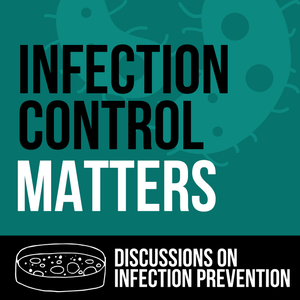
Infection Control Matters
Brett Mitchell
Discussions on Infection Prevention and Control
- 31 minutes 24 secondsReducing CAUTI in intermittent self-catheterisation. The trial that didn't make it..
In this episode, Phil Russo talks to Brett Mitchell and Kate Browne about a study that did not make it over the line. Following a systematic review in 2021 that examined the issue of UTIs in those who self catheterise, a study to examine whether previous work demonstrating a reduction in CAUTI in indwelling catheters through the use of Chlorhexidine for meatal cleansing would be effective was designed. The team discuss the complexities of getting what was essentially a community-based study over the line and why ultimately it did not progress, much to the sadness of the team. previous relevant work is listed below.
Mitchell BG, Prael G, Curryer C, Russo PL, Fasugba O, Lowthian J, et al. The frequency of urinary tract infections and the value of antiseptics in community-dwelling people who undertake intermittent urinary catheterization: A systematic review. Am J Infect Control 2021;49(8):1058-65. https://doi.org/10.1016/j.ajic.2021.01.009.
Fasugba O, Cheng AC, Gregory V, Graves N, Koerner J, Collignon P, et al. Chlorhexidine for meatal cleaning in reducing catheter-associated urinary tract infections: a multicentre stepped-wedge randomised controlled trial. Lancet Infect Dis 2019;19(6):611-9. https://doi.org/10.1016/S1473-3099(18)30736-9.
5 February 2025, 4:00 am - 17 minutes 43 secondsA poster walk at ACIPC 2024
In this episode Brett and Phil chat about a few of the posters presented at the Australasian College for Infection Prevention and Control 2024 Conference held in Melbourne in November 2024. Poster topics include hand hygiene, surveillance, and a pilot RCT on chlorhexidine impregnated dressings.
You can access poster abstracts below and a pdf of the posters here
Improving Hand Hygiene Practices in the Marshall Islands
Epidemiology of Hospital-acquired Bloodstream Infections at a Quaternary Hospital Service
22 January 2025, 4:00 am - 18 minutes 6 secondsEngaging Junior Doctors in IPC
In this episode recorded at the 2024 Australasian College of Infection Prevention and Control (ACIPC) Conference in Melbourne, Brett and Phil talk to Dr Sarah Browning (ID Physician at Hunter New England) and two Junior Medical Officers (JMOs) Sam and Lochlan who worked on IPC-related projects whilst on placement.
8 January 2025, 4:00 am - 46 minutes 12 secondsThe 2024 End of Year Special
In this episode, Brett, Phil and Martin reflect on the year. We chat about favourite podcasts, papers and conferences in our usual informal manner (well probably even more informal than normal). Papers we mention are listed below.
Cimen C, Bathoorn E, Loeve AJ, Fliss M, Berends MS, Nagengast WB, et al. Uncovering the spread of drug-resistant bacteria through next-generation sequencing based surveillance: transmission of extended-spectrum beta-lactamase-producing Enterobacterales by a contaminated duodenoscope. Antimicrob Resist Infect Control 2024;13(1):31. https://doi.org/10.1186/s13756-024-01386-5
Torres-Teran MM, Greentree DH, Varghese MM, Cadnum JL, Pavis RL, Saade EA, et al. Identifying and Remediating Super-splasher Sinks to Reduce Dispersal of Pathogens From Sink Drains. Open Forum Infect Dis 2024;11(7):ofae293. https://doi.org/10.1093/ofid/ofae293
Bush M, Bennett CM, Hutchinson A, Bouchoucha SL. Post implementation quarantine recommendations that support preparedness: A systematic review and quarantine implementation capability framework. Infect Dis Health 2024;29(3):152-71. https://doi.org/10.1016/j.idh.2024.02.004
Dhar S, Jinadatha C, Kilgore PE, Henig O, Divine GW, Todter EN, et al. Lowering the Acquisition of Multidrug-Resistant Organisms (MDROs) With Pulsed-xenon (LAMP) Study: A Cluster-Randomized, Controlled, Double-Blinded, Interventional Crossover Trial. Clin Infect Dis 2024;79(4):1024-30. https://doi.org/10.1093/cid/ciae240
Widmer AF, Atkinson A, Kuster SP, Wolfensberger A, Klimke S, Sommerstein R, et al. Povidone Iodine vs Chlorhexidine Gluconate in Alcohol for Preoperative Skin Antisepsis: A Randomized Clinical Trial. JAMA 2024;332(7):541-9. https://doi.org/10.1001/jama.2024.8531
Leistner R, Kohlmorgen B, Brodzinski A, Schwab F, Lemke E, Zakonsky G, et al. Environmental cleaning to prevent hospital-acquired infections on non-intensive care units: a pragmatic, single-centre, cluster randomized controlled, crossover trial comparing soap-based, disinfection and probiotic cleaning. EClinicalMedicine 2023;59:101958. https://doi.org/10.1016/j.eclinm.2023.101958
Denkel LA, Voss A, Caselli E, Dancer SJ, Leistner R, Gastmeier P, et al. Can probiotics trigger a paradigm shift for cleaning healthcare environments? A narrative review. Antimicrob Resist Infect Control 2024;13(1):119. https://doi.org/10.1186/s13756-024-01474-6
19 December 2024, 4:00 am - 32 minutes 28 secondsIn-room air purification to prevent respiratory infection in aged care - Does it help?
In this episode of ICMs we talk to the authors of a world first multi-centre double blind cross-over randomised control trial, which explored the effect of in-room air purification on acute respiratory tract infections. The rationale and pragmatics of undertaking such a trial are explored, as well as interpretation of the findings.
The lead researcher, Bismi Thottiyil Sultanmuhammed Abdul, a PhD student at the University of Newcastle is joined by some of her supervisors Professors Jenny Sim and Brett Mitchell to explain this study.
The paper can be accessed here: https://jamanetwork.com/journals/jamanetworkopen/fullarticle/2825943?resultClick=1
Reference:
Khadar, B. T. S. A., Sim, J., McDonald, V. M., McDonagh, J., Clapham, M., & Mitchell, B. G. (2024). Air Purifiers and Acute Respiratory Infections in Residential Aged Care: A Randomized Clinical Trial. JAMA Network Open, 7(11), e2443769-e2443769.4 December 2024, 4:00 am - 26 minutes 10 secondsDo you have enough staff in your IP Team? Calculating the staffing requirement for your program
In this episode, Martin talks to Dr Rebecca Crapanzano-Sigafoos (formerly Bartles) who is Executive Director, Center for Research, Practoce and Innovation at the Association for Professionals in Infection Control and Epidemiology (APIC). We talk about about her work on staffing levels for IPC Teams, beginning with her early work looking at workload and then the recent review and paper on data obtained from the beta version of the APIC Staffing Calculator. It turns out that the vast majority of 390+ participating organisations are understaffed.. What might help however was the finding that hospitals that were better staffed had significantly lower infection rates according to accepted published data. Papers we discuss are found below:
- Bartles R, Dickson A, Babade O. A systematic approach to quantifying infection prevention staffing and coverage needs. Am J Infect Control 2018;46(5):487-91. https://doi.org/10.1016/j.ajic.2017.11.006.
- Knighton SC, Engle J, Berkson J, Bartles R. A narrative review of how infection preventionist (IP) staffing and outcome metrics are assessed by health care organizations and factors to consider. Am J Infect Control 2024;52(1):91-106. https://doi.org/10.1016/j.ajic.2023.06.017.
- Bartles R, Reese S, Gumbar A. Closing the gap on infection prevention staffing recommendations: Results from the beta version of the APIC staffing calculator. Am J Infect Control 2024. https://doi.org/10.1016/j.ajic.2024.09.004.
20 November 2024, 4:00 am - Bartles R, Dickson A, Babade O. A systematic approach to quantifying infection prevention staffing and coverage needs. Am J Infect Control 2018;46(5):487-91. https://doi.org/10.1016/j.ajic.2017.11.006.
- 21 minutes 24 secondsCould you have an ERCP-related outbreak? Sequencing to the rescue but you'll have to trash the scope!
In this episode, Martin talks to Cansu Cimen, a researcher at University Hospitals Groningen in the Netherlands, about a recent paper that documents an outbreak and in particular the critical role of next-generation sequencing (NGS) in tracking and controlling the transmission of MDROs via contaminated duodenoscopes.
Focusing on an outbreak linked to ESBL-producing Citrobacter freundii and Klebsiella pneumoniae after endoscopic retrograde cholangiopancreatography (ERCP), standard culture methods failed to detect contamination. After many negative cultures using established methods, destructive dismantling of the implicated scope revealed contamination on hard-to-clean components, highlighting NGS as an effective tool for identifying pathogen transmission pathways.
Cimen C, Bathoorn E, Loeve AJ, Fliss M, Berends MS, Nagengast WB, et al. Uncovering the spread of drug-resistant bacteria through next-generation sequencing based surveillance: transmission of extended-spectrum beta-lactamase-producing Enterobacterales by a contaminated duodenoscope. Antimicrob Resist Infect Control 2024;13(1):31. https://doi.org/10.1186/s13756-024-01386-5.
Download the paper here
8 November 2024, 4:00 am - 12 minutes 13 secondsReducing glove use in the ambulance service
In this episode recorded live at the IPS Conference in Birmingham UK in September 2024, Martin talks to Claire Fitzsimons, Senior Infection Prevention and Control Practitioner at the Northern Ireland Ambulance Service Health and Social Care Trust. We discuss a poster that she presented at the conference that looked as ways of reducing glove use in the ambulance service through a range of improvement methodologies.
A copy of the poster can be found here
23 October 2024, 4:00 am - 13 minutes 3 secondsCan sensors and AI improve cleaning and patient safety?
In this episode, recorded at the 2024 Infection Prevention Society Conference in Birmingham (UK) Brett and Martin talk to Conor McGinn, Assistant Professor in the Department of Mechanical and Manufacturing Engineering at Trinity College Dublin and CEO of Akara AI, a robotics company spin-off from Trinity. We talk about a presentation that Conor gave, demonstrating how infrared sensors analysed by AI can provode feedback on techniques in the operating room and how they could improve cleaning standards in hospitals.
A link to the video we discussed is here https://youtu.be/CPCFuXyQarY?si=xh1RjXAaKeKY708a
and you can also see Conor's talk here https://youtu.be/3SCEkbwKhM4?si=uztJcnVIAe-vq5U8
9 October 2024, 4:00 am - 43 minutes 44 secondsPrevalence, fundamental care, UTI recorded live at the Infection Prevention Society Conference 2024
In our second live session at a major conference, this episode of Infection Control Matters was recorded live at a plenary session to close day 1 of the Infection Prevention Society conference (Birmingham, UK). Our guest panelists include Dr Berit Muller-Pebody an Epidemiologist from the UK Health Security Agency, Prof Jennie Wilson from the University of West London and Dr Jacqui Prieto from The University of Southampton. The panel also fielded many questions from delegates from the floor.
Topics covered include the role of mandatory surveillance, de-implementation, community based IPC, point prevalence studies, the UK PPS, fundamentals of care, urinary tract infection, pneumonia and the direction of IPC.
25 September 2024, 5:00 am - 12 minutes 53 secondsIs IPC the friend of sustainability?
Dr Gemma L Saravanos (she/her) is an infectious diseases epidemiologist and a Registered Nurse leading public health research, and education of pre-registration nursing students. She is based at the Susan Wakil School of Nursing and Midwifery, University of Sydney and works across the Camperdown (Patyegarang) and Westmead (Baludarri) campuses in Sydney.
In this episode, Phil chats to Gemma about an open access publication she led discussing IPC programs contribution to environmental harm, and argues the case that increased investment in IPC is crucial for sustainable health and environmental systems.
Saravanos, G.L., Islam, M.S., Huang, Y. et al. Infection prevention and control programme priorities for sustainable health and environmental systems. BMC Global Public Health 2, 6 (2024). https://doi.org/10.1186/s44263-023-00031-4
18 September 2024, 5:00 am - More Episodes? Get the App
Your feedback is valuable to us. Should you encounter any bugs, glitches, lack of functionality or other problems, please email us on [email protected] or join Moon.FM Telegram Group where you can talk directly to the dev team who are happy to answer any queries.
 Editors in Conversation
Editors in Conversation
 Dateline NBC
Dateline NBC
 Febrile
Febrile
 ZOE Science & Nutrition
ZOE Science & Nutrition